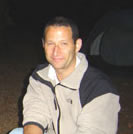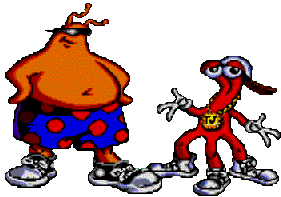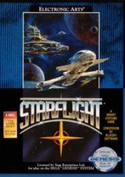Early in the life span of the Genesis, a game was released that had people everywhere talking. It was unique, very non-linear, and could make even the most jaded gamer at least crack a smile. Toe Jam & Earl, released in 1991, was both refreshing and highly original. The random levels ensured you never played the same game twice, and got only better when you brought a friend along. Two sequels followed, cementing the series’ place in history and making it one of the most loved Sega franchises.
 Toe Jam & Earl was designed by Greg Johnson, who has been involved with video games for twenty-four years. Beginning with the EA mega-hit Starflight, Johnson has steadily maintained a level of originality and ingenuity that has kept him in constant demand. He has earned numerous awards for his achievements, and he has been at the forefront of American console game design for over two decades, including a period when it seemed that only those games made in Japan were popular. If history is any indication, Johnson has proven that premise to be false.
Toe Jam & Earl was designed by Greg Johnson, who has been involved with video games for twenty-four years. Beginning with the EA mega-hit Starflight, Johnson has steadily maintained a level of originality and ingenuity that has kept him in constant demand. He has earned numerous awards for his achievements, and he has been at the forefront of American console game design for over two decades, including a period when it seemed that only those games made in Japan were popular. If history is any indication, Johnson has proven that premise to be false.
Together with Mark Voorsanger, Johnson formed Toe Jam & Earl Productions in 1989 and has released several successful products for the Genesis, PC, and Xbox. Since Toe Jam & Earl 3 for the Xbox, he has been doing design consulting work in the area of virtual characters and emotionally-based behavior modeling. He also spent seven months working at Maxis on the Sims 2, and with Will Wright on his new secret project. Johnson has a strong interest in developing games for girls and for families, and has spoken on computer game and interface design, both at the Computer Game Developer’s Conference and at Stanford University. A bio-linguistics graduate from the University of California in San Diego, Johnson also speaks Japanese and Thai almost fluently, and enjoys writing children’s stories as well as designing and playing board games.
Sega-16 was fortunate to speak with Mr. Johnson about Toe Jam & Earl, as well as some of his other works.
Sega-16: You and Mark Voorsanger have been friends for a long time. What exactly brought the two of you together to create games? Was Toe Jam and Earl something you came up with together?
Greg Johnson: Well, no. The concept for the game came from me, or rather my subconscious. Which is not to say that Mark didn’t add a tremendous amount as we got rolling. Mark and I were introduced by another friend and we were all out for a walk on Mount Tamalpais, north of San Fran. and I said to Mark, “Hey, I have this sort of crazy idea for a game. You wanna build it with me?” and he said “Sure, why not.”
Sega-16: How difficult was it to pitch the idea to Sega?
Greg Johnson: Easy. Back then Sega of America was just starting out. They had only about 20 people in their office and didn’t even have any staff lawyers yet (which was maybe just as well for us). The fellow there, Hugh Bowen, was very receptive to the concept. They were really looking for new distinctive titles to help them compete against Nintendo at the time.
Sega-16: The use of random levels added incredibly to the game’s replay value. Was this something you always considered doing, or was it decided later on during development?
Greg Johnson: It was part of the design from the very beginning. That’s because the design of TJ&E was really based on an old favorite game of mine called Rogue. I used to stay up till 4:00 am regularly playing that on the mainframe computer at college. The random levels are really an integral part of the game, and they are part of what make the whole “try to get as far as you can” dynamic work. Each time you get a bit farther and then you have to start all over again. If the game didn’t have random levels that just wouldn’t work. That’s why I’m so bummed when I think about how I allowed outside pressures to cause me to alter the game structure in TJ&E3. Having a hub structure game made the random levels much less integral to the game, and I think it really lost some of the addictive nature of the original.
Sega-16: Were there any concepts that had to be cut from the original Toe Jam & Earl?
Greg Johnson: Not really. Mark and I were just two guys in an office building a game as fast as we could. We just kept adding stuff until our time and money ran out. Looking back it really does feel like the garage shop days. I think we managed to put pretty much everything we wanted to into that original game. Mark was an amazingly fast programmer and he did all of that himself. Really a one man show. I remember towards the end of development each compile would take about 45 minutes on the Genesis dev. system. That meant that Mark had to be extremely meticulous. Bug fixes were really crazy.
Sega-16: Many gamers questioned the changes made to the gameplay in Panic on Funkotron. What made you decide to go in a different direction with the sequel?
 Greg Johnson: We actually started in on a sequel that was very similar to the first game. We got about three months into the game, and had several new features implemented like sliding on ice, and going into caves and buildings when we put on the brakes and decided to change over to a side-scroller. That’s because around that time it was becoming apparent to us that we weren’t getting much support from Sega marketing. They just didn’t get the game – it was too different from their other games. We asked them what they thought and they were enthusiastic about taking a new direction. Mark and I felt it wasn’t worth doing another game that wouldn’t get supported so we switched over. In retrospect its pretty clear that we should have stuck with plan A. I’m sure that even the folks at Sega would say that too.
Greg Johnson: We actually started in on a sequel that was very similar to the first game. We got about three months into the game, and had several new features implemented like sliding on ice, and going into caves and buildings when we put on the brakes and decided to change over to a side-scroller. That’s because around that time it was becoming apparent to us that we weren’t getting much support from Sega marketing. They just didn’t get the game – it was too different from their other games. We asked them what they thought and they were enthusiastic about taking a new direction. Mark and I felt it wasn’t worth doing another game that wouldn’t get supported so we switched over. In retrospect its pretty clear that we should have stuck with plan A. I’m sure that even the folks at Sega would say that too.
Sega-16: Were there ever any plans to bring the series to the Sega CD or 32X?
Greg Johnson: No. TJ&E really sat dormant for awhile while Mark and I did other things. Then ten years later, we came back to it again.
Sega-16: How difficult was it to revisit the series on Xbox after so many years?
Greg Johnson: Well, we didn’t plan to do it for Xbox originally. It was going to be a Dreamcast game and we got close to a release version before we had to jump tracks and rebuild for the Xbox. For the DC version we had a three-player online mode working that was pretty fun, and we had to can it when we switched over. Anyway, it was great fun to get to build out the characters and the world, and to be able to do it with a talented team instead of just me and Mark. Our original plan was to stick very close to the original game format. We got a fair bit of pressure from Sega to “update” the game as they felt that was too “old school,” basically to make it more like Donkey Kong. It was a bit of a tough balancing act. It was really important to me not to lose the original spirit of the game. Also, the Xbox is a pretty hardcore audience and we needed to try and push it in a more teen direction. Ultimately, I think the Gamecube would have been the best platform choice, followed by the PS2. Oh well, live and learn.
Sega-16: Will we ever see Toe Jam & Earl again?
Greg Johnson: I hope so. There is a Hollywood studio which you know well who has optioned the rights. If you know Hollywood at all there’s no telling if they will ever do anything with them or not. In fact, they recently renewed their option so maybe there’s hope. If they did put a movie or show into production we might still see another game. Or maybe I’ll have a chance to do something for the handheld systems. We still get lots of requests for that through our website.
Sega-16: Starflight was a huge and complex adventure for its time. What inspired you to create such a game? Were you involved with the Genesis port?
 Greg Johnson: Switching gears on me eh? That’s going WAY back. Again it was really in EA’s early days, when they had only about thirty people in their office and had only done a dozen games or so. Funny to think about that now. Starflight was the first big selling game on the PC…I remember people saying “no one will buy games for the PC – that’s not what it’s for.” Anyway it was my very first game, a first for all of us on the team. I didn’t really know what a game should be, and it’s amazing that we completed anything at all. I’m glad somebody remembers Starflight (and kind of amazed). And yes, I did the design for the Genesis version but then handed that off to another group to build. Right now there are two groups that I know of working on unofficial sequels to Starflight.
Greg Johnson: Switching gears on me eh? That’s going WAY back. Again it was really in EA’s early days, when they had only about thirty people in their office and had only done a dozen games or so. Funny to think about that now. Starflight was the first big selling game on the PC…I remember people saying “no one will buy games for the PC – that’s not what it’s for.” Anyway it was my very first game, a first for all of us on the team. I didn’t really know what a game should be, and it’s amazing that we completed anything at all. I’m glad somebody remembers Starflight (and kind of amazed). And yes, I did the design for the Genesis version but then handed that off to another group to build. Right now there are two groups that I know of working on unofficial sequels to Starflight.
Sega-16: Would you ever consider doing another installment of Star Control?
Greg Johnson: Star Control wasn’t my game. I did help out on it, but that was really done by two good friends of mine Paul Reiche and Fred Ford. Paul and Fred run a game development studio called Toys For Bob. Back in the old days a bunch of us who developed games used to share a suite of offices, and basically just help each other out on our respective games. Paul let me write the dialogue for a number of the races in Star Control 2 and I think I did the artwork for most of the spaceships, but that’s it. It was Paul’s design. To this day Star Control Melee continues to be one of the games I play the most. I think Paul is one of the most amazing game designers ever.
We would like to thank Mr. Johnson for his time. Please check out TJ&E Productions’ website for more information on all their products. Also, head on over to Choo Choo Soul for some more funky music!

Pingback: » Starflight The Digital Antiquarian